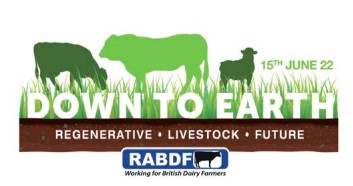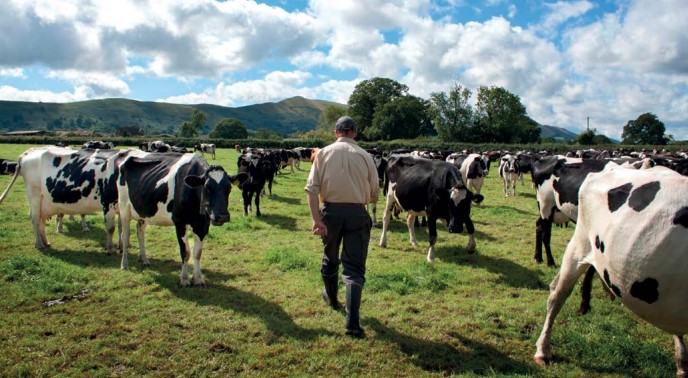
This summer, a brand-new event is being launched to help livestock farmers get to grips with regenerative farming and see it in action on a commercial farm.

Down to Earth, taking place on 15 June in Shropshire, is tailored for beef, sheep and dairy farmers. It offers an arena where the whole industry can come together and address the opportunities, facts, and the science surrounding its principles and see them in action. At its core, regenerative agriculture looks at improving soil health or restoring highly degraded soil. This unique event will offer farmers the practical advice they need to start applying its principles back on their farms.
The event, organised by the RABDF and sponsored by Barclays, Mole Valley Farmers, Promar, Kite Consulting and AHDB, is hosted by organic dairy farmer Tim Downes. He has been using regenerative farming principles for many years and is now reaping the rewards. He is achieving grass yields upwards of 11t of DM a ha without any bought-in inputs, with 4,500L of milk from forage. As well as seeing the regenerative farming principles in action through farm tours throughout the day, Down to Earth will also host top industry speakers, drop-in workshops, practical demonstrations and a range of exhibitors.
Commenting on the event, RABDF Managing Director Matt Knight said: “As pressure mounts for all livestock farming systems to become more sustainable, the RABDF has launched Down to Earth to offer practical faceto-face help to farmers. Regenerative farming can help build a food system that meets the consumer’s needs, the animals and the environment.
“Livestock farmers face unprecedented changes with diminishing farm payments, increasing pressures to farm in an environmentally sensitive way, and looming emissions targets. It’s inevitable, as a result of these mounting pressures, all farmers will have to make some changes to say in business. “In addition, food security is also becoming a cause for concern with the pandemic and the Ukrainian war thrusting it into the spotlight. The UK has some fantastic agricultural land and can utilise the uplands effectively with native breeds. So, finding ways to produce world-class food efficiently and in an environmentally sensitive way is a must!
This year the event will focus on seven key areas of regenerative farming. They are:
Soil Health/Management
Soil health is central to regenerative farming and can directly influence the palatability of the grass, grass quality and yield. Farmers can learn about the basics of soil health, how to test soil, what they should be looking for and top tips on improving soil biology for optimum yields.
Grassland Management
Multi-species swards can produce high yields of quality forage when managed correctly with potential for excellent animal performance. While many features of managing multi-species swards are the same as conventional swards, there are some key differences. Farmers can hear about establishing multi-species swards, the benefits they offer and how they should be managed.
Agroforestry
Trees can offer many benefits in livestock systems, including improved stock health, added nutrient value and environmental benefits. Experts will discuss how trees can be used and established and the grants available to help farmers achieve this.
Water management
Research suggests dairy farms pay between £31 and £100 a cow a year on water. However, there are many ways farmers can reduce costs by using water more efficiently and investing in equipment to help harvest rainwater. However, knowing the most costeffective system, the rules and regulations around using harvested rainwater and working out the potential to collect rainwater based on roofing materials and geography can be mindblowing. Hear about the different types of rainwater harvesting systems available, the cost- benefits, keys considerations, and the latest updates on grants.
Nutrient management – recycling slurry/manure into the system. Cover on the slurry store
Pressure from the government’s Clean Air Strategy to cut ammonia emissions means farms must look carefully at slurry and manure management. This means farmers may be required to cover slurry stores, apply slurry using low emission spreading equipment and bring in tighter housing designs. Experts will talk about preparing for new rulings coming from the Clean Air Strategy, including identifying the grants available.
Bokashi bugs – improving soils
The Japanese process ‘bokashi’ can turn manure into a valuable soil improver whilst reducing carbon and nitrogen emissions. The technique involves ensiling farmyard manure, inoculated with a mix of microbes to create an optimal soil conditioner used to promote soil microbiology, while significantly reducing carbon and nitrogen losses. It is believed every 1t of bokashi applied can save 40-50kg of bagged fertiliser. At Down to Earth, visitors can find out how to get started with Bokashi, the costs and paybacks, and see the finished result of the process.
Carbon workshops
Conducting a carbon audit is something most farmers will have to do as the net-zero deadline nears. Farmers can learn how to get started with carbon auditing, what’s involved, the costs and tips on getting started on the journey to net-zero. Experts will also delve into the science behind carbon sequestration and outline why farmers are part of the solution to climate change.
